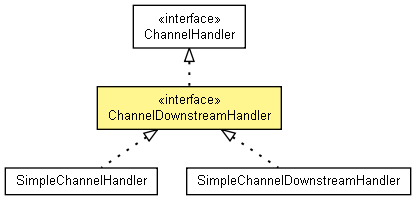
|
||||||||||
| PREV CLASS NEXT CLASS | FRAMES NO FRAMES | |||||||||
| SUMMARY: NESTED | FIELD | CONSTR | METHOD | DETAIL: FIELD | CONSTR | METHOD | |||||||||
public interface ChannelDownstreamHandler

Handles or intercepts a downstream ChannelEvent, and sends a
ChannelEvent to the next handler in a ChannelPipeline.
A downstream event is an event which is supposed to be processed by
a series of downstream handlers in the ChannelPipeline. It is often
an I/O request made by a user application.
The most common use case of this interface is to intercept an I/O request
such as Channel.write(Object) and Channel.close(). The
received ChannelEvent object is interpreted as described in the
following table:
| Event name | Event type and condition | Meaning |
|---|---|---|
"write" |
MessageEvent | Send a message to the Channel. |
"bind" |
ChannelStateEvent(state = BOUND, value = SocketAddress) |
Bind the Channel to the specified local address. |
"unbind" |
ChannelStateEvent(state = BOUND, value = null) |
Unbind the Channel from the current local address. |
"connect" |
ChannelStateEvent(state = CONNECTED, value = SocketAddress) |
Connect the Channel to the specified remote address. |
"disconnect" |
ChannelStateEvent(state = CONNECTED, value = null) |
Disconnect the Channel from the current remote address. |
"close" |
ChannelStateEvent(state = OPEN, value = false) |
Close the Channel. |
Other event types and conditions which were not addressed here will be
ignored and discarded. Please note that there's no "open" in the
table. It is because a Channel is always open when it is created
by a ChannelFactory.
You might want to refer to ChannelUpstreamHandler to see how a
ChannelEvent is interpreted when going upstream. Also, please refer
to the ChannelEvent and ChannelPipeline documentation to find
out what an upstream event and a downstream event are, what fundamental
differences they have, and how they flow in a pipeline.
You can forward the received event downstream or upstream. In most cases,
ChannelDownstreamHandler will send the event downstream
(i.e. outbound) although it is legal to send the event upstream (i.e. inbound):
// Sending the event downstream (outbound) void handleDownstream(ChannelHandlerContextctx,ChannelEvente) throws Exception { ... ctx.sendDownstream(e); ... } // Sending the event upstream (inbound) void handleDownstream(ChannelHandlerContextctx,ChannelEvente) throws Exception { ... ctx.sendUpstream(new DefaultChannelStateEvent(...)); ... }
You will also find various helper methods in Channels to be useful
to generate and send an artificial or manipulated event.
handleDownstream
may be invoked by more than one thread simultaneously. If the handler
accesses a shared resource or stores stateful information, you might need
proper synchronization in the handler implementation.
Also, please refer to the ChannelPipelineCoverage annotation to
understand the relationship between a handler and its stateful properties.
| Method Summary | |
|---|---|
void |
handleDownstream(ChannelHandlerContext ctx,
ChannelEvent e)
Handles the specified downstream event. |
| Method Detail |
|---|
void handleDownstream(ChannelHandlerContext ctx,
ChannelEvent e)
throws Exception
ctx - the context object for this handlere - the downstream event to process or intercept
Exception
|
||||||||||
| PREV CLASS NEXT CLASS | FRAMES NO FRAMES | |||||||||
| SUMMARY: NESTED | FIELD | CONSTR | METHOD | DETAIL: FIELD | CONSTR | METHOD | |||||||||